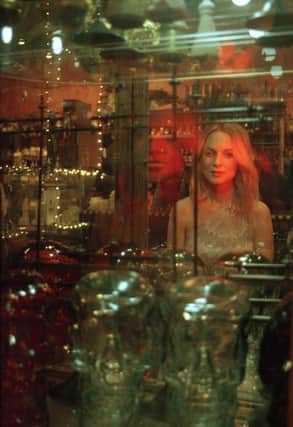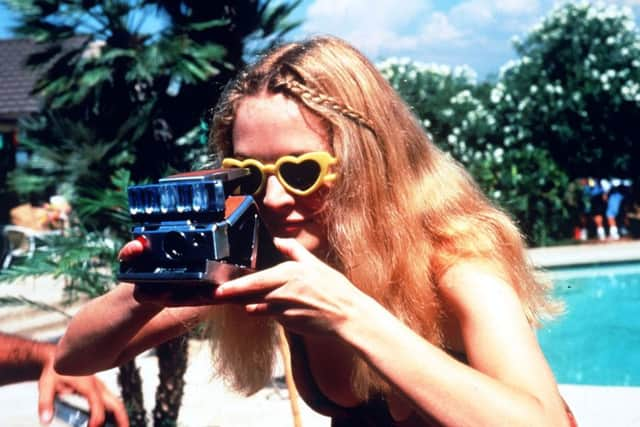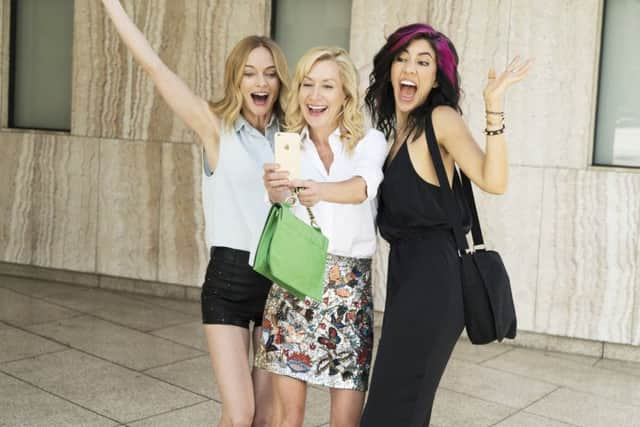Heather Graham on dealing with misogyny in Hollywood


That’s just one of many sexist lines that a frustrated Heather Graham says she heard in real life and used as fodder for her new film, Half Magic, her first as a writer-director, in which she also stars. A romantic comedy, it’s about a development assistant (aka, “D-girl”) named Honey who is fed up with sexism in Hollywood. Her misogynist boyfriend and boss, an action star, is played by Chris D’Elia.
He is given “all the lines people said to me,” says Graham, 48, one of the first actresses to share her #MeToo story in the wake of the revelations about Harvey Weinstein published by the New York Times and the New Yorker.
Advertisement
Hide AdD’Elia’s character is based on no one in particular, though, she says.


“He’s a composite of a guy I dated who’s a director and a director I worked with who I didn’t date and just entitled male Hollywood action stars I’ve met,” says Graham, who is freshly showered and glowing after a sweaty 85-minute yoga session at YogaWorks in Santa Monica, California. When asked if another of her boorish on-screen boss’s zingers – “Your breasts are too big, they make you look dumb” – was also mined from personal experience, she nods.
“I feel like the chips are stacked against us,” says Graham, meaning all of womankind. She is wearing all black: Reformation jeans, Topshop tee, Madewell leather jacket and no make-up. “When I go out, I try to figure out a way to not have to wear high heels.” Beneath a hat, her hair still wet, and unselfconsciously slathered in moisturiser, she peruses the menu at Café Gratitude, the LA vegan mecca popular with celebrities.
“We get a lot of mixed messages from the culture,” she says. “One message is all that matters is your looks, and you’re judged on that – you’re supposed to be sexy. On the other hand, your sexuality is judged in a negative way.”
Graham knows this double bind intimately, having been cited on increasingly antique-seeming lists like People’s 50 Most Beautiful People and FHM’s 100 Sexiest Women in the World. Her best-known roles, including Rollergirl in Boogie Nights, Felicity Shagwell in Austin Powers and Jade in The Hangover, are all highly sexualised women.


“I don’t know. I think when you start to play those kind of roles, you get offered more like that,” she says. “Maybe it’s just your destiny to get those jobs.” But, she adds, “I feel like those roles could be better written. Most are written by men, and men sometimes limit women. They want to put her into a box: the prostitute, the stripper, the porn star. They don’t show her as a complicated, interesting, fully rounded person.”
Advertisement
Hide AdIn real life, Graham is reserved and bookish, she says. “I did bring some make-up, but I forgot to put it on.”
Her newfound pleasure is comedy, particularly the work of Issa Rae, Frankie Shaw and Amy Schumer. “The comedians I like are the people who are very real, honest and raw. I respect that,” she says. “I always think people are beautiful when they’re real.”
Advertisement
Hide AdShe has not found celebrity easy. “It’s almost like you have two personalities,” Graham says, citing an oft-told story about Marilyn Monroe walking down a street in New York with a friend, who watched in awe as she went from obscure to ogled in a nanosecond simply by “turning on” some internal electricity.


“I still feel like I’m this nerdy person that’s a little bit shy,” she says, alluding to her teenage “geek” self, who grew up in Milwaukee, took Advanced Placement classes and longed to be “the pretty girl” who got attention from guys. These days, she says, “I can pretend to be a Hollywood actress who’s glamorous. You can have a persona that’s not really you.”
Of Honey, she says: “I guess there was a part of me writing this where I wanted to be more my real self as opposed to something people see me as.”
Like Graham, Honey was raised a strict Catholic. The character is haunted, sometimes mid-coitus, by the image of her pulpit-pounding childhood priest (Johnny Knoxville), who yells at parishioners, “Do you want to go to heaven? Or do you want to go to hell?” (The latter being the destination for those who have premarital sex.)
“How does this woman learn to let go of this baggage when she’s been taught to feel shame and fear about sexuality?” Graham asks rhetorically. “It’s kind of self-hating, self-flagellating. We all have a natural sexuality that’s part of our physical being when we’re born. How does this woman see it as a spiritual part of herself she can love and appreciate? Because I felt like I had to learn that.”


Like Honey, Graham had to learn to “break out of her sexist world to make her women’s movie,” she says. In search of meatier roles, she hired a producing partner to help develop female-driven material. “One was about the Triangle Factory Fire of 1911, something I felt incredibly passionate about,” Graham says, referring to the sweatshop inferno that killed 145, many of them young immigrant women. However, she says, “People kept telling me nobody cares about women’s stories.”
Advertisement
Hide AdFed up, she wrote a humorous fictional script, incorporating witchcraft into its plot. The title is a nod to a book of the same name by Edward Eager, her favourite as a girl. “These kids find a magical coin, and whenever they make a wish they get only half of what they wished for,” Graham says of its plot. “I think that’s like life. There’s an element we can control and an element we can’t, and we have to surrender to that.” (Early reviews have been mixed but encouraging.)
Graham, who has been practicing meditation since David Lynch introduced her to it on the set of Twin Peaks when she was 21, had to take some deep breaths when her first backer fell through and she had to fold the film, which was then in preproduction. “It was incredibly traumatic,” she says of the experience of having to tell the cast and crew that the movie “just fell apart.”
Advertisement
Hide AdAbout a year later, she found a champion in Bill Sheinberg, a producer who stepped in to rescue the project. “He liked the message of the movie,” says Graham, who adds that without the support of men like Sheinberg and Michael Nickels, a close friend who served as a producer on the film and encouraged her to direct it, Half Magic would never have been made.
“There are men who really want to empower women,” she says. “All the men getting fired over the past several months, there’s a lot of men making those decisions. The idea that that kind of domineering, sexist guy that used to be so celebrated is now becoming outdated and uncool, I think that’s amazing culturally, because that’s more powerful than telling someone, ‘Don’t act like a jerk.’”
And when all else fails, a few amulets and runes?
“As a woman, sometimes I feel disempowered in this society,” Graham says, explaining her interest in the occult. “To be a witch seems to me to be the opposite of that. Witches are powerful and wise and misunderstood. I think of femininity that way, because femininity is very powerful, but sometimes it’s misunderstood and seen as weak. I think we, as women, are much more powerful than we give ourselves credit for. For us to see the power we have is the next step. Look how we took down all those powerful men with our voices. Think about what we can do next.”
Half Magic is out now